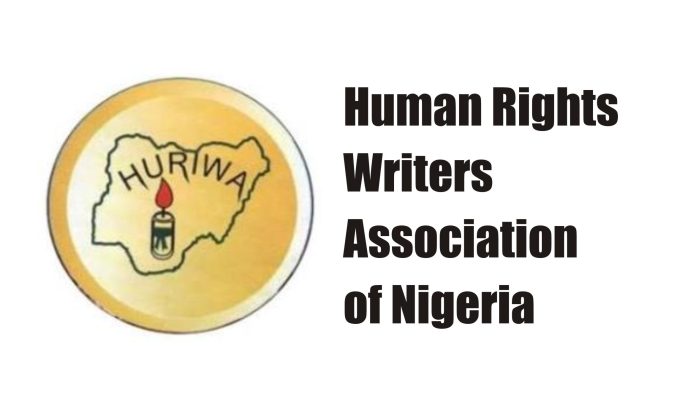The Human Rights Writers Association of Nigeria (HURIWA) has condemned the reported excessive number of security checkpoints along the Onitsha-Enugu Expressway, describing it as unconstitutional, dehumanizing, and a form of organized punishment on the people of the South-East.
HURIWA expressed concern that the 105-kilometer journey, which should be relatively short, is marred by the presence of 28 security checkpoints, averaging 3.7 kilometers between each one.
According to HURIWA, these checkpoints, manned by various security agencies including the Nigerian Army, Nigerian Police Force, Federal Road Safety Corps (FRSC), have subjected travelers to constant harassment, delays, and extortion.
The association condemned this practice as archaic, colonial, and oppressive, suggesting it paints a picture of the region as being under siege.
HURIWA identified key locations along the expressway where these checkpoints are situated, including Awkuzu Junction, Amawbia Junction, Ugwuoba boundary, Oji River Junction, and Onyeama Hill. The association expressed concern that this excessive security presence not only inconveniences travelers but also fosters extortion by security personnel.
In a press statement signed by its National Coordinator, Comrade Emmanuel Onwubiko HURIWA emphasized that the mounting of numerous checkpoints along the expressway violates the constitutional right of Nigerian citizens to free movement, as enshrined in Section 41 of the 1999 Constitution.
The group argued that the excessive number of roadblocks is a direct affront to the dignity of the people, particularly in the South-East, where such levels of militarization are most pronounced.
HURIWA stated that these security checkpoints appear to be more of a tool for harassment than a genuine effort to ensure security. The association claimed that ordinary citizens, especially commercial drivers, are often forced to pay bribes at the checkpoints to avoid delays or harassment. The group pointed out that such practices contribute to the erosion of trust between citizens and security agencies.
It also highlighted that the proliferation of checkpoints along the Onitsha-Enugu expressway is having a detrimental effect on the socio-economic life of the region.
HURIWA noted that as a major commercial route, the delays caused by the checkpoints have significantly impacted businesses and traders who rely on the road for transporting goods.
The association noted that the region’s economy has suffered as constant interruptions discourage economic activity and investment.
The group argued that while security is important, the current approach is counterproductive and undermines the economic stability of the South-East.
HURIWA stated that these security checkpoints appear to be more of a tool for harassment than a genuine effort to ensure security. The association claimed that ordinary citizens, especially commercial drivers, are often forced to pay bribes at the checkpoints to avoid delays or harassment. The group pointed out that such practices contribute to the erosion of trust between citizens and security agencies.
It also highlighted that the proliferation of checkpoints along the Onitsha-Enugu expressway is having a detrimental effect on the socio-economic life of the region.
HURIWA noted that as a major commercial route, the delays caused by the checkpoints have significantly impacted businesses and traders who rely on the road for transporting goods.
The association noted that the region’s economy has suffered as constant interruptions discourage economic activity and investment.
The group argued that while security is important, the current approach is counterproductive and undermines the economic stability of the South-East.
HURIWA emphasized that other regions in Nigeria do not face such excessive security measures, questioning why the South-East is treated differently.
HURIWA called on the governors of the South-East to engage in dialogue with the Service Chiefs and the Inspector General of Police to explore alternative security strategies.
The association stressed that “there are modern and efficient methods of maintaining security without subjecting the people to undue hardship or violating their constitutional rights.
It advocated for the “adoption of community-based security initiatives and improved intelligence gathering, which it believes would be more effective in addressing security concerns in the region. The group also called for better coordination between local law enforcement and communities to ensure a more targeted and humane approach to security.
The association further “urged the National Assembly to review the current operations of security agencies in the South-East, particularly along the Onitsha-Enugu expressway.
It called for “strict oversight to ensure that security operatives act within the bounds of the law and do not use their positions to harass or exploit citizens.”
The group stressed the need for accountability, stating that the activities of security personnel at these checkpoints must be closely monitored to prevent abuse of power.
HURIWA demanded that security agencies be held accountable for any actions that violate the rights of citizens.
In conclusion, HURIWA reiterated its call for an “immediate review of the security situation along the Onitsha-Enugu expressway. The association emphasized that the current pattern of mounting security checkpoints is unconstitutional and must be addressed urgently. It called on South-East governors and the federal government to collaborate in developing alternative security strategies that respect the rights and dignity of the people.”
Share your story or advertise with us: Whatsapp: +2347068606071 Email: info@newspotng.com















